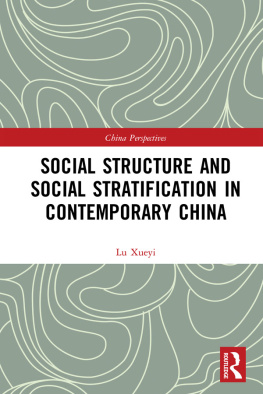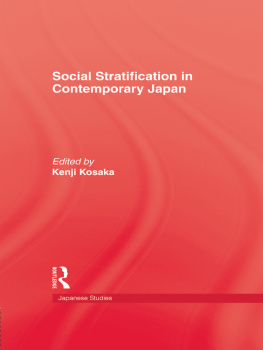ROUTLEDGE LIBRARY EDITIONS: POLITICAL GEOGRAPHY
Volume 3
POLITICS, GEOGRAPHY & SOCIAL STRATIFICATION
POLITICS, GEOGRAPHY & SOCIAL STRATIFICATION
Edited by
KEITH HOGGART AND ELEONORE KOFMAN
First published in 1986
This edition first published in 2015
by Routledge
2 Park Square, Milton Park, Abingdon, Oxon, OX14 4RN
and by Routledge
711 Third Avenue, New York, NY 10017
Routledge is an imprint of the Taylor & Francis Group, an informa business
1986 Keith Hoggart and Eleonore Kofman
All rights reserved. No part of this book may be reprinted or reproduced or utilised in any form or by any electronic, mechanical, or other means, now known or hereafter invented, including photocopying and recording, or in any information storage or retrieval system, without permission in writing from the publishers.
Trademark notice: Product or corporate names may be trademarks or registered trademarks, and are used only for identification and explanation without intent to infringe.
British Library Cataloguing in Publication Data
A catalogue record for this book is available from the British Library
ISBN: 978-1-138-80830-0 (Set)
eISBN: 978-1-315-74725-5 (Set)
ISBN: 978-1-138-80038-0 (Volume 3)
eISBN: 978-1-315-75548-9 (Volume 3)
Publishers Note
The publisher has gone to great lengths to ensure the quality of this reprint but points out that some imperfections in the original copies may be apparent.
Disclaimer
The publisher has made every effort to trace copyright holders and would welcome correspondence from those they have been unable to trace.
POLITICS, GEOGRAPHY & SOCIAL STRATIFICATION
Edited by
KEITH HOGGART and ELEONORE KOFMAN
1986 Keith Hoggart and Eleonore Kofman
Croom Helm Ltd, Provident House, Burrell Row, Beckenham, Kent, BR3 1AT
Croom Helm Australia Pty Ltd, Suite 4, 6th Floor,
64-76 Kippax Street, Surry Hills, NSW 2010, Australia
British Library Cataloguing in Publication Data
Politics, geography and social stratification.
1. Social classes 2. Anthropo-geography 3. Social classes Political aspects
I. Hoggart, Keith II. Kofman, Eleonore
305 HT609
ISBN 0-7099-3784-9
Croom Helm US, 27 South Main Street,
Wolfeboro, New Hampshire 03894-2069
Library of Congress Cataloging-in-Publication Data
Politics, Geography, and Social Stratification Includes index.
1. Social classes Great Britain Congresses.
2. Social structure Great Britain Congresses.
3. Political sociology Congresses. 4. Great Britain
Politics and government 1945- Congresses.
I. Hoggart, Keith. II. Kofman, Eleonore.
HN400.S60P65 1986 305.50941 86-16539
ISBN 0-7099-3784-9
Printed and bound in Great Britain by Billing & Sons Limited, Worcester.
CONTENTS
Keith Hoggart and Eleonore Kofman
John Urry
Alan Warde
Linda Peake
Nigel Thrift
David Byrne
Jamie Gough
Monique Pinon-Charlot
Chris Hamnett and Bill Randolph
Peter Williams
The conference from which the papers in this volume are drawn was organised on behalf of the Social Geography Study Group of the Institute of British Geographers. We should like to thank the committee members of that study group for their advice and support in organising that conference. Also, much credit must be given to the Institute of British Geographers for providing financial assistance to help cover the expenses of the conference and for aiding poorly funded and non-funded graduate students to attend it.
The Scientific Section of the French Embassy, London, and in particular Agnes Pivot, provided advice and obtained financial support for us to enable Monique Pinon-Charlot to present a paper at the conference.
In addition, the following publishers have kindly given their permission for material to be reproduced in this volume: Macmillan Press for from Fogarty, Prospects of the Industrial Areas of Great Britain , 1947.
KEITH HOGGART AND ELEONORE KOFMAN
The title of this volume reflects the dominant themes within it and is indicative of the increasingly interdisciplinary thinking in the social sciences. The material in this volume(1) was first presented at a conference titled Geographical Aspects of Social Stratification at which sociologists and geographers participated. Both the papers and the discussions at the conference repeatedly emphasised the political dimension and implications of analyses of spatial differences in social structuring. Thus the primary contribution of this volume to social research are the links which are drawn between, first, the geographical basis of social stratification and social relations and, second, the political outcomes of socio-spatial differentiation. However, the set of papers do not attempt to cover the entire gamut of the subject matter of the various themes explored in the volume. Instead, it seeks to present original papers which focus on particular aspects, concepts and processes within socio-spatial structuring and its political consequences.
To understand the origins of this collection of papers, which span geography, politics and sociology, it is necessary to highlight the growing awareness of a need to relate sociologically based research on social stratification with geographical analyses of social differentiation. From the sociological perspective, the theorising and investigation of social structures has predominantly been national in orientation. This is largely because the analysis of social classes and stratification has mainly been situated within macro-sociology. It has been concerned with abstract generalisations and the broad constraints of social structures (for an attempt to bridge the micro and macro-social theory gap, see Knorr-Cetina and Cicourel 1981).
In a British context, this tendency has been aided by the commonly ascribed representation of British society as highly homogeneous in spatial terms. Only recently have major regional social divisions and regional political parties been afforded much attention. The resurgence of regionalist and nationalist movements, the more sharply demarcated North/South political and economic cleavage, and the spatially variable performance of Britains third (so-called centre) political party, have all contrived to challenge this image and emphasise the critical role of location in socio-political differentiation. In France a similar awakening of interest in the geographical dimensions of social structuring has occurred. Here, a research interest has developed on the new middle class (Bidou 1983; Benoit-Guilbot 1985), which was a major element in bringing the socialists to power in 1981, and particularly on the political alliances they forged at the local level. The importance of the geographical dimension in these studies is brought out in the manner in which the middle class defines itself through a set of symbols, social practices and position in the economic structure. Since these are inherently heterogeneous, the same forces of unification or production of (a middle) class does not hold in all localities. The middle class as a socio-political force has thereby been articulated in quite distinctive ways across localities (see Apkarian-Lacout and Verges 1983 for a study of a communist municipality; and Verges 1983 for a general analysis of class alliances in local politics).






